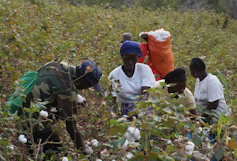By Anna Porcuna-Ferrer, Laura Calvet-Mir and Victoria Reyes-García
The Bassari people, a farming community of about 20,000 people, live in an area between Senegal and Guinea. During French colonial rule, the Bassari lost part of their communal land to a national park and were subjected to poll taxes and forced labour. Senegal achieved independence in 1960 and in 2012 the Bassari area was declared a world heritage site, a change that bolstered small-scale tourism.
Today, the Bassari peoples’ main livelihood comes from rainfed smallholder farming, supplemented by activities such as petty trade, crafts, wage labour, artisanal gold mining, and gathering honey and wild edible plants. They have limited access to public health and education, and they obtain water from wells. Electricity is limited to the few with solar panels. However, the Bassari population is growing, integrating into the mainstream market economy and adopting new crops and technologies.https://datawrapper.dwcdn.net/4D6x6/1/
The Bassari live in an area affected by climate change. As part of the Local Indicators of Climate Change Impacts research project, we wanted to understand how the community viewed climate change and its impacts. We interviewed people and convened group discussions in three Bassari villages and found that increased temperatures, dry spells, and the shortening of the rainy season were the most reported changes. Many people also reported forest degradation, plant and animal loss, and soil erosion.

Scientists often discuss climate change as a biophysical problem driven by fossil fuels combustion (burning coal, oil, gas and other fossil fuels to create energy). We found that the Bassari, like many other nature-dependent communities, understand climate change differently: as part of a network of overlapping climate, environmental, cultural, political and socio-economic changes.
Our findings support the argument that Indigenous and local knowledge and views must be included in climate change research and policy. Prioritising western, technical voices ignores communities like the Bassari in the design of climate change adaptation plans. Acknowledging their knowledge and views transforms research and policy priorities, resulting in more locally relevant climate change mitigation strategies.
Climate change is part of a network of changes
In our conversations with the Bassari, it was evident that they did not see climate change as an isolated phenomenon. For them, global warming and its impacts were inextricably linked to other environmental, political, socio-economic and spiritual changes that were transforming their way of life.

For instance, most of the people we interviewed agreed that wild edible plants such as baobab, weda or madd (Saba senegalensis), shea tree and African locust bean that had always been consumed and sold no longer grew as well as before.
To explain the decrease in abundance and productivity of wild edible plant species, the Bassari use elements of their local knowledge of the environment and of their cosmovision, which emphasises that everything in the universe is related. An elder told us: “Trees do not give like before … because now people harvest to sell, not to eat. That’s why trees have stopped giving.” The implication was that the decline in wild fruit productivity was not only a consequence of climate change but also a punishment for commercial harvesting, a more intensive form of resource exploitation.
The abandonment of ancestral practices was also used to explain the decrease in productivity and availability of wild edible plants: “We used to have ceremonies and many cultural practices for trees to give a lot of flowers. Now, nobody practises them anymore, therefore trees give less fruits,” another participant said.
Climate change also affects Bassari through the direct impacts of extreme weather events such as droughts. Though aware of how climate change affected their farming, the local communities were driven by socio-economic pressures. Sometimes, they adopted practices that increased their long-term vulnerability to climate change.

For example, Bassari farmers traditionally cultivated, selected and stored dozens of local crops. These were eaten and used as medicine, in ceremonies, as animal feed or to restore soil fertility. Traditional crops played a key role in local diets, were nutritious and were well adapted to poor soils and to erratic rainfall.
However, in recent decades and driven by colonial and post-colonial policies and agricultural development projects in the region, the Bassari community has begun growing crops with higher market value and yield. These require less work but demand more water. This shift caused the decline of diverse, indigenous, drought-tolerant crops. In adapting to socio-economic changes by growing cash crops, the Bassari may lose out in climate resilience.
Lessons learned
Local knowledge can contribute to a more thorough understanding of the many impacts that climate change has on local environments and rural livelihoods. The experiences of rural populations are a source of knowledge to identify these specific impacts.
Our research showed that climate change must be viewed through local people’s perspectives. Climate change impacts cannot be separated from the ecological, social, political, historical and cultural context in which they occur. Climate change interacts with multiple stressors which often make people more vulnerable. To build effective climate change adaptation strategies, governments and policy makers should understand the very wide range of people’s experiences.
Read more: Insights from Senegal: involving farmers in research is key to boosting agriculture
Bassari don’t need to adapt only to climate change but to change in general. This is why climate change adaptation policies need to be designed according to the needs and desires of local communities. If not, they won’t be culturally appropriate or locally feasible. Only by promoting a dialogue between different ways of knowing, and by taking into account how climate change is differently experienced in reality, will policymakers be able to meet the real needs of local communities.
Santiago Alvarez-Fernandez, Ndèye Fatou Faye, Théo Guillerminet, Benjamin Klappoth, Vanesse Labeyrie and Eva Porcuna-Ferrer co-authored the research that this article is based on.




